Across the Line of Leadership and Literature
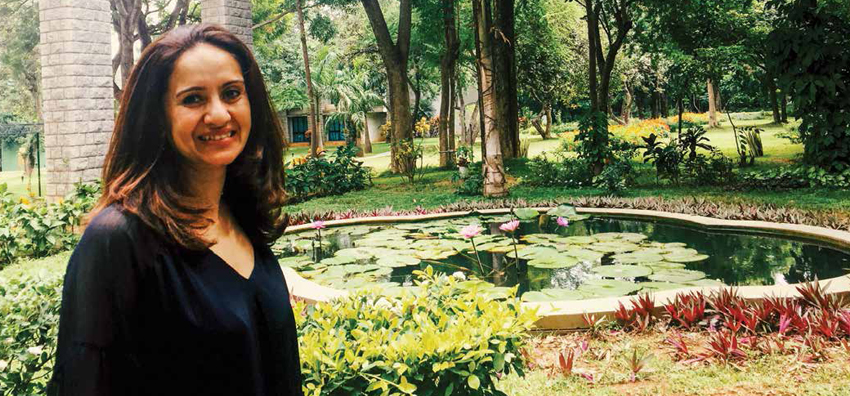
"From an investment banker, serving in internationally acclaimed banks and financial institutions, London based Nayanika Mahtani, now dabbles in creativity, as she writes books and film scripts. An insight into her dashing life, filled with energy, enthusiasm and courage of conviction"
"I learnt lessons in humility from interacting with some of the finest minds whom we were privileged enough to be taught by IIM B lessons on how to take what we do seriously, but not ourselves. I learnt about the inter-connectedness of things and how to be able to build a narrative around it"
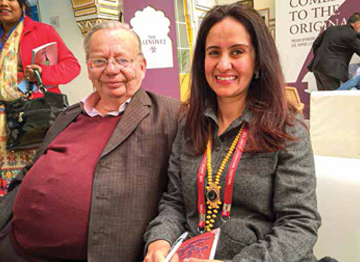 With the inimitable Ruskin Bond at the Jaipur Lit Fest
With the inimitable Ruskin Bond at the Jaipur Lit FestNayanika Mahtani once harboured dreams of becoming a stage actor, but she followed the proverbial left side of her brain to do an MBA at IIM Bangalore and became an investment banker. She began her banking career at ANZ Grindlays Bank (now Standard Chartered). She started out in Trade Finance, learnt the ropes of Credit Administration and Corporate Banking and was then given the responsibility of some of the Bank’s prime corporate clients, which at the time included the Tata and Mahindra accounts. Some years later, she joined JP Morgan Chase as VP-Corporate Finance, with the key charge of the Oil and Aerospace verticals. Her responsibilities included origination of M&A and financial advisory opportuni-ties, deal structuring, analysis of industry and arrange-ment of funding.
A decade later, she followed her heart to live in Africa. Since then, she’s been following the right side of her brain and is now an author and screenwriter. Nayanika’s books include Ambushed, The Gory Story of Genghis Khan (aka Don’t Mess with the Mongols) and her latest book, “across the line”. She has also recently co-written the story and screenplay for a Hindi film based on the extraordinary life of the mathematical genius, Shakuntala Devi. Nayanika lives in London with her family, their dog, hamster and two goldfish named Sushi and Fishfinger. Corporate Citizen spoke to her about her successful journey.
Where did you spend your childhood? Tell us the highlights and some impressions that continue to stay with you.
I spent my childhood, following my parents, across many incredible parts of India, with the longest stop being in Kolkata. Stories were very much a highlight of my childhood. I was one of those exasperating 4 year olds who would linger forever over mealtimes-unless you could offer a story along with the meal and then I would magically be galvanised into action. So, my poor mother invented a whole series of adventures about a little old lady who lived in a forest and was secretly saving the day rescuing creatures great and small from calamities great and small whilst everyone assumed she was just sitting around knitting by the fireplace. And mealtimes flew by.
"I followed the proverbial left side of my brain and pursued an MBA at IIM Bangalore where I majored in Finance and Organisational Behaviour. The two years I spent at the IIM were invaluably enriching in broadening my perspective and provided the scaffolding for my later life"
When did you spin dreams of becoming a stage actor? What were the dreams and how and why did they not bear fruit?
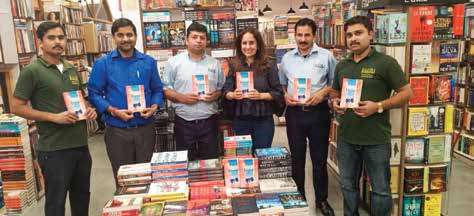 With the wonderful team at Bahrisons Bookstore, Gurugram
With the wonderful team at Bahrisons Bookstore, GurugramIn my last year of high school, a director from Theatre Action Group (TAG), held auditions for a musical. As it happily turned out, not only did those selected got to act and sing, our director even let us co-write the script (which was being adapted from an existing play) and the lyrics. The music was composed by an unassuming guitar teacher called Loy Mendonsa (who went on to get rather famous as Shankar-Ehsaan-Loy). The play was performed at Siri Fort Auditorium and it was probably sometime around then, that I began to harbour dreams of studying drama and acting in musical theatre. I enrolled in dra-ma workshops with TAG, where a charismatic actor called Shah Rukh Khan (who also went on to get rather famous) would cue us for improvs and trust exercises. Occasionally, we were asked to volunteer as ushers at fabulous performances, and I’d watch, wide-eyed. Life was on track, as far as I was concerned. Until I realised that Real Life was about to begin and it would follow a slightly different script, as a banker.
With so much of creativity in you, what prompted you do an MBA at IIM Bangalore, which is an academic course, so technical. What are your learnings from the MBA course?
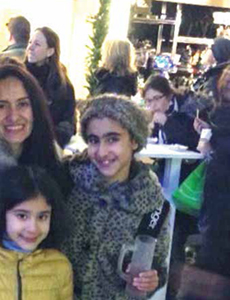 The latest release: Across the Line
The latest release: Across the LineI guess I always was academically inclined. On hearing of my plans to study drama, my father (who was also very keen on theatre and had even acted in a few productions of the Kendall’s traveling theatre company, Shakespeareana) sat me down and suggested that I shouldn’t narrow my options just yet. He advised that I perhaps follow a more conventional path and get financially independent to steer my life in whichever direction I later chose and added, that knowing me, drama would always be in the picture, ir-respective.
So, I followed the proverbial left side of my brain and pursued an MBA at IIM Bangalore where I majored in Finance and Organisational Behaviour. While I never did admit it to him, I think my father was right. The two years I spent at the IIM were invaluably enriching in broadening my perspective and provided the scaffolding for my later life. Perhaps the biggest takeaways for me were learning how to learn and unlearn and relearn. Interacting with batchmates who came from various different disciplines challenged the framework through which I had until then viewed things.
For instance, it was eye openingly invigorating (and unnerving) to have the IIT sorts deconstruct everything I had taken as a given about economics, because they were approaching it through a completely different lens. The course helped me appreciate the incredible compounding effects of collaboration and inclusion of diverse points of view. I learnt lessons in humility from interacting with some of the finest minds whom we were privileged enough to be taught by (and sometimes learn with) lessons on how to take what we do seriously, but not ourselves. I learnt about the inter-connectedness of things and how to be able to build a narrative around it. It is amazing how all of this came into play later in life.
Tell us about your career as a banker. Which bank did you work for? What was your designation and what were your responsibilities?
I began my banking career at ANZ Grindlays Bank (now Standard Chartered). I started out in Trade Finance, learnt the ropes of Credit Admin-istration and Corporate Banking and was then given the responsibility of some of the Bank’s prime corporate clients, which at the time included the Tata and Mahindra accounts.
Some years later, I joined JP Morgan Chase as VP-Corporate Finance, with the key charge of the Oil and Aerospace verticals. My responsibilsities included origination of M&A and financial advisory opportunities, deal structuring, analysis of industry and arrangement of funding. It was heady and exciting interacting with business leaders across various industries and there was much to absorb and learn from.
What would be your advice to youngsters who are waiting in the wings to be launched in the corporate world? What are the qualities required to attain success in their careers?
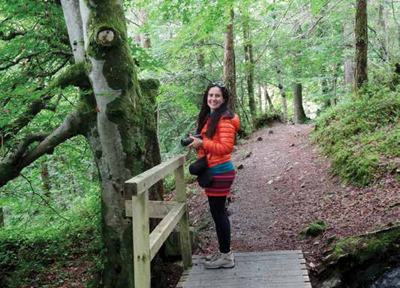
I’m not sure I’m the best person to be doling out advice on corporate careers given that I opted for a career in the creative arts halfway through, but for what it’s worth here are my two bits it’s the advice I offer to my daughters too.
Invest yourself wholly in whatever it is that you do. If you don’t quite know what it is that makes you want to jump out of bed each morning, that’s fine too explore different avenues but give each one an honest chance. You can successfully have many different portfolios of experiences and they can lead to more than one career in very fulfilling ways. I am reading a book titled “Range” by David Epstein which talks about why generalists are triumphing in a specialist world. It’s a very interesting read. Keep learning as you go. Reinvent yourself, if you need to. Celebrate your friendships at work and at school/university. I have been helped along the way by the unstinting support of my friends and offer help in turn, whenever I’m able. Most importantly, enjoy the journey.
Your stay in Africa. Please give details of your sojourn there
We moved to Africa for a few years owing to my husband’s work. I got a job with Citibank but my older daughter was less than a year old and I did not have the support system to manage a banking job and a baby. Instead, I started an entrepreneurial venture, promoting tribal handicraft by Indian and African craft communities seeking a platform for sustenance. Africa is an amazing continent there is so much to learn about life by travelling to new places. My peripatetic sojourn continues with more continent hopping. After having been in Asia and Africa, we are now in Europe.
"Invest yourself wholly in whatever it is that you do. If you don’t quite know what it is that makes you want to jump out of bed each morning, that’s fine too explore different avenues but give each one an honest chance"
From the corporate world to the literary world. How was the transition?
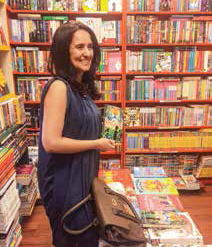 At the Full Circle Bookstore,
At the Full Circle Bookstore,Khan Market, Delhi
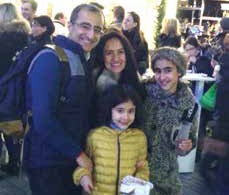 With the family
With the familyThe transition happened in a most unplanned manner. While in Africa, I happened to audition for a writing assignment for Sesame Workshop and got selected. I was asked to create content for the outreach programme of Sesame Street’s India chapter (Galli Galli Sim Sim) for children who did not have access to television. I realised that I loved writing and got into copywriting from there on, which suited me given that my children were still young and I could work out of the home. Before I knew it, it was 2015 and Penguin Random House published my first book (which was beyond my wildest dreams). Then two more books and a film script followed.
I suppose the hardest part of the transition from the banking world was that a literary career requires a lot of courage. Firstly, the courage to turn your back on a very rewarding pay package. But more importantly, the courage to put what you have created on display for the rest of the world to judge not just your boss, your colleagues and clients too as would be the case in a banking career but everyone who picks up that book is going to judge you, which can be very intimidating. But it was also very liberating in a sense because I think I had reached a stage in my life where I knew that doing something was less scary than not doing it, even if it meant falling flat on my face in the process. And if I had to give my younger self any advice, it would be this don’t hold back for fear of failing.
Tell us something about your books “across the line”, “Ambushed” and “The Gory Story of Genghis Khan”. Your journey in writing them and a bit about the storylines.
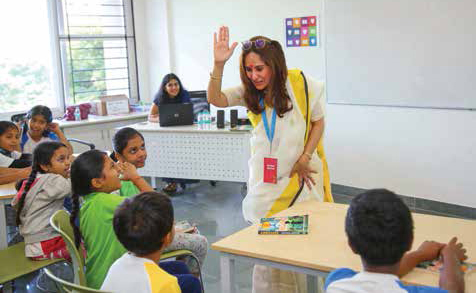 With the sparky children at the Neev Lit Fest, Bengaluru.
With the sparky children at the Neev Lit Fest, Bengaluru.Don’t hold back for the fear of falling
I honestly believe that stories choose us. For my first book, “Ambushed”, it was the photograph of a jailed poacher and a tiger in a National Geo-graphic magazine, and to me, they both looked trapped in circumstances beyond their control. It was as if their eyes were calling out to someone anyone to tell their story. When I wrote “The Gory Story of Genghis Khan (a.k.a. Don’t Mess with the Mongols)”, it was because Genghis Khan had invaded my head, thundering into it on horseback and not budging until his utterly fascinating side of the story was told.
For my latest book, “across the line”, the seed was an unspoken conversation with my grand-father, when I was about ten years old; a conversation I wish I had had but didn’t find the words for at the time. My grandparents, like millions of others, were rendered refugees in the aftermath of the Partition. Yet, they never spoke about this cataclysmic upheaval in their lives. Except for once but, sadly, that conversation remained unfinished. I felt the silence of what was left unsaid consumed me until the silence was deafening. I had to revisit those unspoken words and the only way I knew how, was to write. Rooted in the Partition, across the Line is a tale of borders and beliefs shaped by the games people play. My intent in writing this story is not to indulge in a blame game, but to give our youngsters a window into the events that led to the Partition and what followed and to explore what we could perhaps take away from it, in today’s tumultuous times.
It is amazing that you co-authored the screenplay for a Hindi film based on the mathematical genius, Shakuntala Devi. Tell us more.
It was incredibly fortunate how that all fell into place. Shakuntala Devi had done a Math show at my school in Kolkata when I was about seven years old, but I still remember it as if it was yesterday she left me completely mesmerised. I loved how she made numbers come alive Maths was no longer just a dry subject she showed us how joyful the journey with numbers could be. Decades later, I found myself co-writing a script about her extraordinary life along with the director of the film, Anu Menon who also lives in London. For our story, we needed to conduct extensive interviews with Shakuntala’s daughter and son-in-law, Anupama and Ajay, who also happened to live in London and also happened to be looking to share Shakuntala’s story with the world. It was as if the story had chosen its time and its tellers. And then to have the incredibly talented Vidya Balan play the role of Shakuntala Devi and bring her to life on the big screen was beyond fabulous. We’re really excited about the film it will be in cinemas in May this year.
"I suppose the hardest part of the transition from the banking world was that a literary career requires a lot of courage. The courage to turn your back on a very rewarding pay package"
Since when have you shifted to London? Tell us about your life there. And about your dog, hamster and the two goldfish.
Our family has been in London for the past 11 years so our daughters have pretty much grown up here; although, we try and go back to India every possible chance we can. Our life here is just the usual I suppose we’re kept incredibly busy by our puppy, while the hamster and gold-fish are less demanding thankfully.
What is your view on Indian authors today?
We have some absolutely brilliant Indian authors. Their voices are original, compelling and vividly bring the amazing plurality and essence of being Indian to life. But I think we still need many, many, more Indian voices telling our stories.
What is the philosophy of life that you live by in three or four sentences?
I love these words by Rumi “Let yourself be silently drawn by the strange pull of what you really love. It will not lead you astray.” That per-haps is what I try and live by, combined with another favourite ‘Have courage and be kind.’